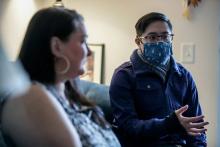Patti Shah Karam wasn’t in a healthy head space. It was the day before Thanksgiving and big holidays are hard for her, as she’s mostly estranged from her family.
But [UW Geography B.A. Alum] Thai Nguyen, a 31-year-old peer mental health counselor who was at Shah Karam’s Shoreline apartment for their weekly meeting, helped pull her out of bed and out of a funk, she said.
Remind yourself that you want better in life, he told Shah Karam, 55. That this negative pattern doesn’t have to continue. “I know it doesn’t feel that way, but that’s what we’re going to keep working on.”
Shah Karam nodded. “See how he is. No matter what happens, he boosts me up,” she said.
Nguyen’s work as a peer counselor — someone who has personal experience with mental health challenges or substance use and uses that expertise to support others — represents a growing niche in the mental health landscape. Peers build close connections by relating to people in a way clinicians don’t. And because peers don’t require the same level of schooling and licensure, they can get trained faster and start working, helping close the gaps for a behavioral health industry desperate for more staff.
